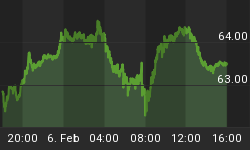In Europe, it appears that today was unofficially "beat up periphery bonds day." Greek 10y yields shot up 30bps to a new high of 13.15% (which sounds juicy until you remember you're probably not going to get it for very long). Portuguese 10-year yields rose 14bps to a new high of 8.77%. Irish 10-year yields jumped 26bps to 9.15% but below last month's 10% highs. Even Spanish 10-year note yields rose 9bps, to 5.3%. All of the high-quality names, such as Switzerland, Germany, France, the UK, the Netherlands, and Sweden for example, were roughly unchanged. These losses were provoked, in theory, by comments by Germany's Finance Minister suggesting that Greece might need to restructure its debt if a June audit finds that it may have trouble paying creditors. There is no question that Greece will have trouble paying creditors; the only questions are whether an official audit would actually say so, and what "restructuring" means in the context of a country that has multiples of the debt burden that is sustainable. It sounds a lot like "socking it to the bondholders," but surely no one who was holding Greek bonds actually expected them to pay off at par? If so, then the real problem here is the ease with which investors are sustaining disbelief in the face of obvious impossibilities.
Back on this continent, Initial Claims rose to 412k, the highest level in two months. It is, though, only a single week and nothing yet to raise many eyebrows.
Stocks opened weak after the overnight futures session had taken prices lower (well before the Claims data, incidentally) and proceeded to trudge higher throughout the day before eventually ending unchanged. Bond yields rose with the 10y note up to 3.49%, despite a good bond auction.
The Treasury announced a 5y TIPS auction for next week; the $14bln in new April-2016s was slightly larger than the market had expected and will be auctioned next Thursday (after a TIPS buyback on Wednesday).
There were several speakers today but the most interesting to me was Philadelphia Fed President Plosser. Plosser is supportive of instituting an inflation target to encourage public confidence in the Federal Reserve as an inflation fighter. This is a curious thought. It's a lot like a baseball player trying to encourage public confidence by declaring he has a target to hit 0.375. Perhaps there are some really dim people who would say "whew, that's good. We really needed our shortstop to hit 0.375!" But for most of us it's not the target, but hitting the target, that inspires confidence, right? Suppose thereafter that the hitter proceeds to actually bat 0.250. Does the fact that he publicly declared his intention to hit 0.375 increase his credibility, or decrease it? I would argue the latter, since it establishes that he didn't really have the control he thought he did.
I am not sure it's any easier to hit an inflation target than to hit a fastball. The hubris of Fed officials, thinking that all they have to do is declare their target and then hit it, is arresting. Of course we'll hit it. When have we made a big mistake in the past?!? So in a way it's even worse than the hitter example I gave above. Instead, it's a 35-year old career 0.250 hitter declaring a 0.375 target. It's delusional, if not downright comical, or even sad.
None of the speakers today - Duke, Kocherlakota, Plosser - see any inflation pressures, or any real chance that headline inflation will pass into core inflation. This is good, since the consensus for headline CPI tomorrow is +0.5%, taking the year-on-year figure from 2.1% to 2.6%. Core inflation is expected to be +0.2% for the third consecutive month (a phenomenon we haven't seen since early 2009) and to lift the year-on-year core inflation reading to +1.2% from +1.1%.
My models have a short-term peak in the housing contribution coming right around now, with year-on-year inflation drifting only a little higher between now and mid-summer before continuing to rise through the end of the year. Recently, the part of CPI that is attributable to housing has been on the rise, as the chart below illustrates, and your forecast for core inflation is necessarily going to be reliant on your housing inflation forecast.

Shelter CPI has clearly bottomed but might not yet be surging.
The trend looks very positive for inflation, but unfortunately this doesn't appear to be the beginning of a sharp surge higher but rather the reflection of the meaningful decline in the inventory of existing and new homes for sale over the course of 2009. Because inventories bounced sharply higher into 2010 (see Chart below), it is too optimistic to expect the housing part of inflation to continue to rise as aggressively as it has been.

The rise in inventories last year should have a dampening effect on further near-term gains in Shelter CPI.
That being said, there are plenty of other elements of core inflation that are rising, and the uptrend is well-established. I think that the +0.2% consensus expectation for tomorrow might be a teensy bit ahead of itself but I wouldn't put money on that forecast.
Also tomorrow, the Empire Manufacturing Index (Consensus: 17.00 from 17.50) is due to be released at the same time as CPI; later in the morning the consensus expectation is for a strong gain in Industrial Production (Consensus: +0.6%, with Capacity Utilization rising to 77.4% from 76.3%), which if the expectations are correct will be plenty to keep the inflation people happy even if the CPI report itself turns out to be slightly disappointing. Finally, the mid-morning release of the Michigan Confidence figures (Consensus: 69.0 from 67.5) will cap the week's data. With this last report, remember to watch the consumer expectations for inflation 5-10 years ahead, which rose significantly last month.















